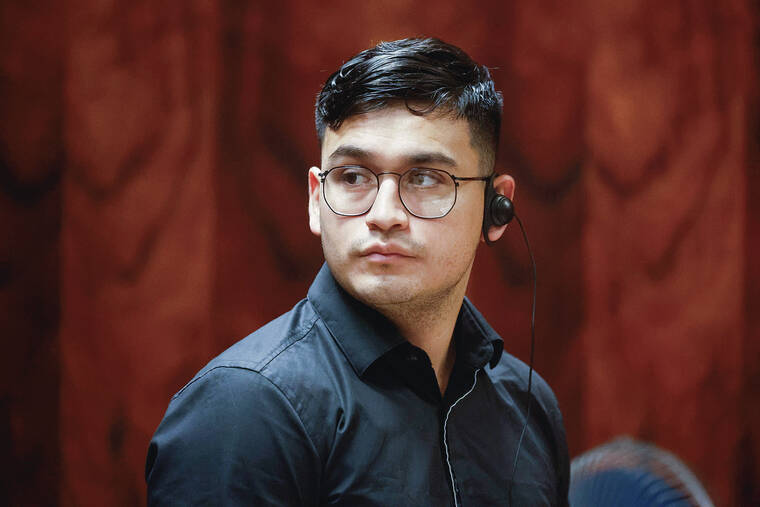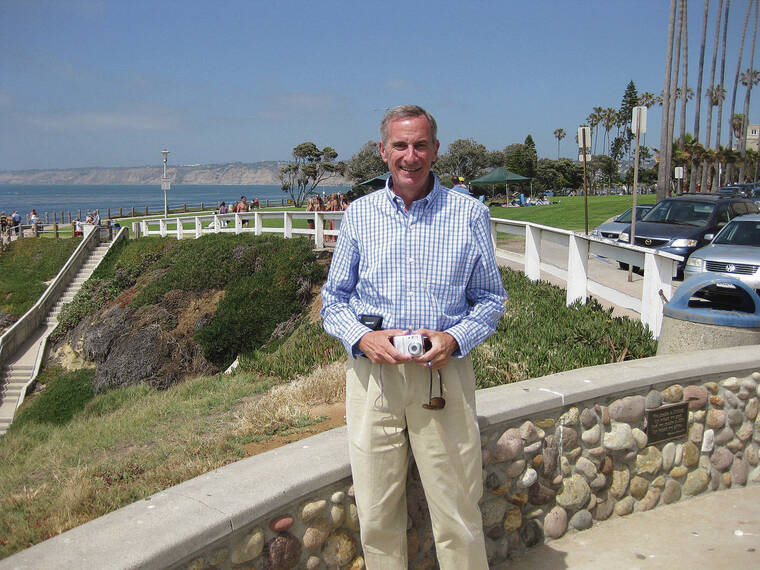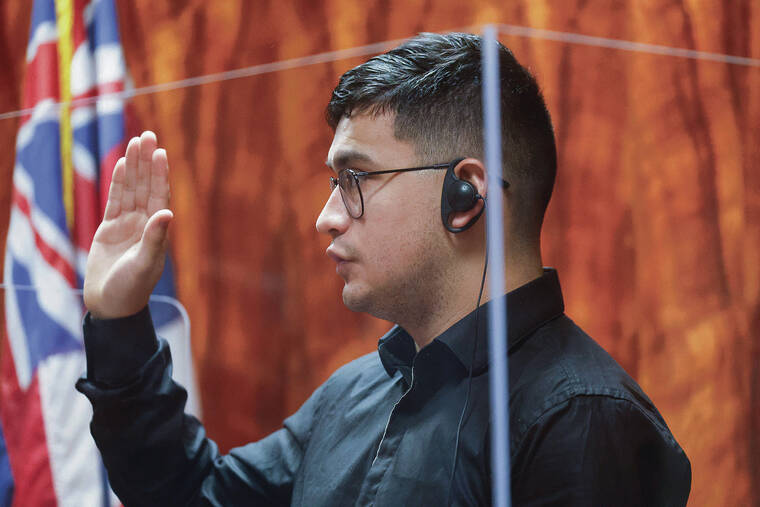Murder victim alive when cement was poured, prosecutor suggests

GEORGE F. LEE / GLEE@STARADVERTISER.COM
Charged in the 2022 murder of Gary Ruby, defendant Juan Baron appeared at a hearing Monday to change his guilty plea in the courtroom of Judge Catherine Remigio.

COURTESY ROY SEKIGAHAMA / 2010
Gary Ruby

GEORGE F. LEE / GLEE@STARADVERTISER.COM
The hearing before Oahu Circuit Court Judge Catherine Remigio on Baron’s motion to withdraw his guilty plea, which began in October, will be continued. The new date will be determined Dec. 23, and will include testimony by his former attorneys and an interpreter.



Deputy Prosecutor Scott Bell’s questioning on the stand of the now 26-year-old Colombian man who wants to take back his guilty plea in the 2022 murder, identity and property theft of 73-year-old Gary Ruby revealed why his former lawyers recommended taking the plea deal.
As Bell ticked off the list of 10 points in a seven-page letter as to why prosecutors could seek an extended term of life without parole, Juan Baron responded they had read each one to him.
But when Bell asked whether they read to him “that there’s an inference that Gary was still alive when you poured the cement over him,” Baron did not give his stock answer.
Instead he said, through a Spanish- language interpreter, “They explained all of that, but those are all speculations.”
Baron previously pleaded guilty to second-degree murder, identity theft and two counts of theft of property.
The hearing before Oahu Circuit Judge Catherine Remigio on Baron’s motion to withdraw his guilty plea, which began in October, will be continued. The new date will be determined Dec. 23 and will include testimony by his former attorneys and an interpreter.
Don't miss out on what's happening!
Stay in touch with breaking news, as it happens, conveniently in your email inbox. It's FREE!
Other points given in the letter:
>> Ruby was older than 59.
>> Baron attempted to make it look like a suicide by slitting Ruby’s wrists.
>> Baron bought cement and buried Ruby’s body in cement.
>> The state has photographs of Ruby’s body pulled from the bathtub.
>> Baron attempted to essentially take over Ruby’s life and his Hawaii Loa Ridge house, and wanted to exchange his car because he did not like the color.
>> Baron’s conduct while “Gary was dead in the bathtub” included drinking, partying, socializing inside and outside his house.
>> Baron fled the state once police began investigating.
Court documents say Baron confessed March 10, 2022, to Los Angeles Police Department detectives that he strangled Ruby with a belt after Ruby began choking, placed him in a bathtub, dumped bags of cement he found in the garage over the body and went to the hardware store for more cement.
He testified he spoke in English and Spanish to the two Los Angeles detectives, but when he asked whether they could continue in Spanish, he was told that wasn’t permitted.
Baron said his former lawyers Myles Breiner and Kyle Dowd, retained by Baron’s mother, read a seven-page letter giving him three options.
Option A, which he agreed to and signed March 11, 2024, was to accept the state’s counteroffer, which was to plead guilty as charged, and the state would not seek extended-term sentencing (life without parole) and would recommend to the Hawaii Paroling Authority not to ask for a mandatory minimum beyond 20 years.
He said Dowd was “very insistent that that was the only offer we were going to receive and that was because of his relationship with Ayla (Deputy Prosecutor Ayla Weiss, who went on maternity leave).” Dowd said he and Weiss worked together before and were “frenemies,” Baron testified.
Randall Hironaka, Baron’s court-appointed attorney, who took over the case after Breiner and associate Dowd withdrew, seeks to prove Baron did not fully understand the plea deal, did not have an interpreter present when the options were read to him, was fearful of being executed and was affected by prescription drugs.
Baron said a weekly prescription drug he takes may have caused him to overreact when he thought he would die in prison.
But when the judge asked at his plea change hearing whether he was taking any drugs (interpreted as “drogas”), he thought the judge was referring to illicit drugs, and said no to taking drugs or alcohol. Yet when asked by Bell, Baron said in Colombia “drogas” is the word used for both illicit and prescribed drugs, not “medicamento.”
Baron testified Oct. 7 that Breiner and Dowd told him he would die in prison if he did not take the deal. Baron took that to mean he would be put to death in the electric chair.
He said his former lawyers first talked to him about pleading guilty as charged in March, and their original plea offer was to ask for a 20-year concurrent sentence.
They had initially discussed a motion to suppress his statements to LAPD, but that was never filed because of a motion to dismiss the case or disqualify the Department of the Prosecuting Attorney or to disqualify the original prosecutor for sharing with the public photos of the victim.
“Myles, Kyle and I were very positive about the motion to dismiss the charges, and that’s why we didn’t do the other motions because what the prosecutor had done was very serious and how it was hidden,” Baron said.



